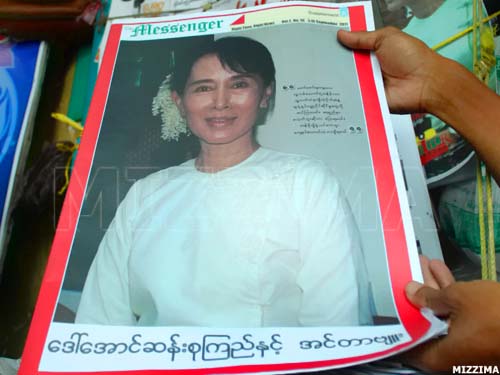New Delhi (Mizzima) – The Burmese censorship board has issued a light punishment to “The Messenger” journal by banning its supplementary news in the upcoming Sunday issue. The penalty was for publishing supplementary pages containing an interview with Aung San Suu Kyi in their last issue without the prior permission of the censorship board.
As punishment, “The Messenger” will have to submit its final stories to the censorship board on Wednesday for its September 11 issue. The journal published the interview with Suu Kyi in its September 4 issue. The punishment was only for one issue, on September 11.
The censorship board, which operates under the Information Ministry, took the action for violating its rules and regulations, but as usual censor officials did not elaborate, said a journal spokesperson.
“We could not find space for the interview in our regular pages and because of a lack of time, we published it in supplementary pages,” said an editor.
In the journal market, scoops and breaking news are usually published as supplementary pages. Observers said that the first-ever exclusive interview with Aung San Suu Kyi in a domestic journal increased its circulation.
The weekly journal is published on Sundays. It must submit drafted copy to the censorship board on Mondays and Wednesdays for approval prior to publication. It can submit supplementary news or additional news on Saturday as supplementary drafts. Supplementary news is usually fresher.
“They [censors] are serious because this was an interview with Aung San Suu Kyi,” said an editor of a domestic journal, and the authorities are sensitive to any information about her, including photographs.
The publisher of the “The Messenger” is Zaw Min Aye, a son of Union Election Commission chairman Tin Aye. The journal published its article under the title “Aung San Suu Kyi’s views on the youth of the current age.”
Rangoon journalists said that similar interviews with Suu Kyi would appear in other journals. According to recent regulation changes by the Censor Board, 180 journals that publish information about news, crime, education, economics or religion must submit their final draft articles for prior approval before being published. The category is called “Submit then Publish” or “Tin Htote.”



